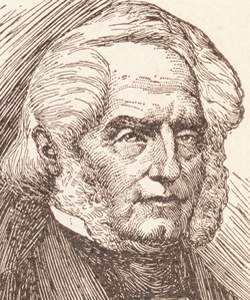Hamilton Rowan Gamble, Dred Scott (American National Biography)
Scholarship
When Missouri moved to an elected supreme court in 1851, a change that Gamble had championed for some time, he secured an easy election, serving until 1854. In the most noted case to come before the court during his term, Gamble, in a lone dissenting vote, asserted that Dred Scott was entitled to his freedom because his master had taken him into free territory--a view in accord with eight previous decisions by the Missouri Supreme Court but now unpopular with his two fellow justices, who were proslavery Democrats.
William E. Parrish, "Gamble, Hamilton Rowan," American National Biography Online, February 2000, http://www.anb.org/articles/04/04-00401.html.
Hamilton Rowan Gamble, Civil War (American National Biography)
Scholarship
Gamble inherited an exceedingly difficult situation in 1861 and dealt with it quite credibly. He determined from the outset to let Missourians retain as much control of their internal situation as the establishment of martial law would allow, hence his concern to have local militia cooperating with federal military authorities to try to keep order. While Gamble's relationship with the federal military commanders at St. Louis was not always harmonious because of their jealous guardianship of authority, the militia worked fairly effectively given the turbulent condition of the state. Gamble's insistence on the militia's use allowed many Missourians who would not have volunteered beyond the state's boundaries to participate in the war effort. Although determined to protect slavery at the beginning of the war, Gamble moderated that stand as it became obvious that sentiment was shifting toward some form of emancipation. He effectively steered a middle course on that issue. Throughout the war his was the voice of local control and moderation, and his leadership did much to hold Missourians together during the four years of internecine strife.
William E. Parrish, "Gamble, Hamilton Rowan," American National Biography Online, February 2000, http://www.anb.org/articles/04/04-00401.html.



